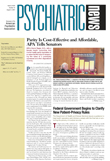A critical issue facing early career psychiatrists today is the push by psychologists to have state legislatures grant them prescribing privileges.
I don’t think that my motives for choosing a career in psychiatry are foreign to many of us in the field. I wanted to serve my patients, understand the process of the mind as it unfolds in a therapeutic relationship, and understand the complicated workings of both body and brain.
Overall, it sounds simple to me—focus on the minds and approach a patient’s treatment from a biopsychosocial framework. It is the basic philosophy that was taught to me in medical school and reinforced throughout my postgraduate training. It is the philosophy that I continue to embrace as an early career psychiatrist.
As I see it, there are some similarities between the roles of a psychiatrist and psychologist. Psychologists, too, are dedicated to serving the needs of their “clients.” Because of their intensive training, psychologists are well grounded in approaching the mind of the people they treat, and healing occurs through the course of the therapeutic relationship.
Psychologists differ from psychiatrists, however, in that they receive intensive training in the administration, use, and interpretation of psychological instruments.
There is, however, a vital component that distinctly separates the fields of psychiatry and psychology—that is, the biomedical piece.
As psychiatrists and psychologists, we are well aware of the differences in training and expertise. But in the lay community, there has long been confusion about how the two professions differ.
That crucial difference, of course, is that psychiatrists are physicians, with all the training, knowledge, and skill that is required before one can practice medicine. Sometimes I believe that, even within our own community, we forget this vital piece of information. Psychologists have never been through medical training, and minimal education in pharmacology will not make them competent to prescribe potent psychotropic medications.
Although many psychologists agree that those practicing their discipline should not be prescribing psychotropic medication, there is a strong faction of psychologists who have rallied to fight for the right to prescribe. There have been multiple articles in Psychiatric News that have detailed the lobbying efforts in states throughout the U.S., the most frightening being the recent effort in New Mexico that came extremely close to succeeding (Psychiatric News, April 20).
We psychiatrists must be aware that this is an issue that will not disappear. The psychologists seeking prescribing privileges are well organized, well funded, and committed to achieving their goal. Their cause, unfortunately, is aided by lawmakers in many states who still think the two professions are interchangeable.
Now for what I consider to be the most critical piece, our patients. I will draw from my own professional experience in this example knowing that you, too, have had such experiences. When I was caring for patients in the hospital, there were very few generalist or specialist physicians who were eager to come to the unit for consultation. We know that our severely ill patients often have comorbid illnesses. It truly is the most disturbed who are the most at risk. These are the patients who have the most difficult time receiving consistent, competent care. These patients deserve to be treated by medical professionals who have an understanding of their pathology beyond their psyches.
Another argument has been repeatedly made by those lobbying for psychologist-prescribing privileges, namely, that there aren’t enough psychiatrists to meet the need for mental health services. Throughout our country, there are areas underserved by psychiatrists. These areas are also often underserved by other physicians and mental health professionals, including psychologists.
However, you can rest assured that the vast majority of psychologists who seek prescribing privileges will not be living in those underserved rural and inner-city areas. Just as I cannot see psychologists prescribing for patients with comorbid illness, I do not believe that psychologists who gain prescribing privileges will flock to areas they have shunned to this point.
I could continue to respond to the multitude of arguments presented by lobbyists seeking prescribing privileges for psychologists, but I think my viewpoint is clear.
In conclusion, I feel that the effort of psychologists to gain prescribing privileges is a very important issue facing early career psychiatrists. At this time, however, I feel that we should look within.
If we truly care about our patients and profession, we all need to become actively involved with this issue within APA both at the national and district branch levels and through local governments. It’s not that I’m against psychologists gaining prescribing privileges. . . . as long as they go to medical school to get those privileges. ▪
